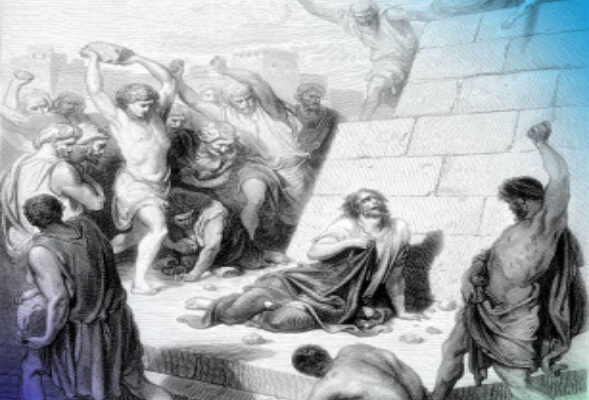Loyal Dixians often state a desire for the South to be a Christian country. We had better be sure that we understand what that entails.
Many wonderful visions come to mind: Churches full of parishioners singing hymns, receiving the holy mysteries, praying, etc.; families saying their prayers together at home in the morning and at night and before they eat their meals; the honoring of the saints of our forefathers; magistrates of the government carrying out their duties with the love of God and of their fellow citizens as their inspiration; and so forth.
But there is another side of this that is not so often spoken or thought of: suffering. This is inevitable for Christians, either as individuals, families, church congregations, or as the great family – the ethnos. The Holy Apostle Paul is explicit: ‘Yea, and all that will live godly in Christ Jesus shall suffer persecution’ (II Timothy 3:12).
If Dixie begins to walk the path of dedication solely to Christ, we will face opposition from the enemies of God. In a sense, this is old news. Southern love for the Holy Trinity brought upon us the wrath of the apostate Yankees in the War; and what remains of our love for God continues to animate the God-hating Yankees/globalists to make life as miserable for us as they are able.
Nevertheless, there is also a sense that an independent, Christian South will eliminate all of this once and for all; that, being separated from the Yankee/Leftist States will mean the appearance of a calm Golden Age.
Church history forbids such a fantasy. Two countries come quickly to mind: Serbia and Georgia. From the time of their baptisms, both have suffered frequent crucifixions by the enemies of the Church: pagan Persian fire-worshippers, Muslim Turks, communists, and others besides. Dixie has a certain kinship with both, owing to all three being conquered by anti-Christian powers, which we have described elsewhere. For Serbia, see this essay, as well as this one. For Georgia, see here and here. Yet they remain faithful to God, and He continues to resurrect them from the grave.
We turn once again to the history of Georgia to illustrate what awaits the South in one form or another if we walk the path of faithfulness to Christ. It is the story of the martyrs and princes Bidzini, Elizabar, and Shalvi (Feast Day 18 Sept.). In their time, Georgia was being forcefully resettled with foreigners (something Southerners can easily identify with):
In the 17th century the Persian aggressors razed churches, monasteries, and fortresses and drove out thousands of Georgian families to resettle them in remote provinces of Persia. The deserted territories were settled by Turkic tribes from Central Asia. In the chronicle The Life of Kartli it is written: “The name of Christ was not allowed to be uttered, except in a handful of mountainous regions: Tusheti, Pshavi, and Khevsureti.”
The Lord, as He so often does, raised up leaders to help the Georgians in their time of dire need:
But the All-merciful Lord aroused a strong desire in the valiant prince Bidzina Choloqashvili of Kakheti and, together with Shalva and his uncle Elizbar, princes of Aragvi and Ksani provinces, he led a struggle to liberate Kakheti from the Tatars. (The Persian governor of Kakheti, Salim Khan (1656-1664), had been encouraging the Tatar tribesmen to profane the Christian churches.)
With the help of God and one of His most renowned saints – the Patron Saint of Georgia, in fact – the holy princes routed the Persians and praised their Holy Benefactors:
On the moonless night of September 15, 1659, the feast of the Alaverdi church (The feast of Saint Joseph of Alaverdi) the united army of all eastern Georgia assembled and crossed over the mountains, past the village of Akhmeta, and launched a surprise attack on the Persians from Bakhtrioni Fortress and Alaverdi Church. The invader’s armies were so utterly crushed that their leader, Salim Khan, the Persian governor of Kakheti, barely succeeded in escaping from the avengers, after he had abandoned his family and army.
The victorious Georgian army offered prayers of thanksgiving to the Lord God and Great-martyr George, the protector of the Georgian people, who had appeared visibly to all during the battle, riding his white horse like a flash of lightning and leading the Georgians to victory.
But the celebration of victory was short-lived. Torments and death awaited them at the command of Shah Abbas II and his underlings:
. . . the enraged Salim Khan, the vassal of Shah Abbas, ordered the beheading of Elizbar and Shalva, hoping by this to break Bidzina’s resolve. But his efforts were in vain. “There is nothing sweeter than death for Christ’s sake!” Bidzina proclaimed.
The Ksani princes calmly bowed their heads, but the undersized executioners could not reach the stately princes with their swords. So the shah’s henchmen hacked each of the princes in two at the shins, then decapitated them after they had fallen to an accessible height.
But even the murder of his companions would not cause Saint Bidzina’s will to waver. So the enemies resolved to break his will by mockery. They draped the bound prince in a chadar (the veil worn by Muslim women), seated him on a donkey, and paraded him through the streets. Then they began to butcher him alive. One by one they cut off his fingers and toes, then they chopped off his hands and feet, then his arms and legs, until only his head remained unharmed. It was clear from the movement of his lips that the holy martyr was praying.
Then one of the persecutors pierced his heart with a spear. This happened in the year 1661. The mutilated bodies of the holy martyrs remained under the open sky for one day, and no one was permitted to go near them.
At the end of it all, once again the Heavenly Father exalted His children:
During the night they were illumined by a brilliant light. Then a group of Christians secretly buried the saints’ remains. Several years later Saint Shalva’s wife Ketevan and son David sent several of the faithful to Persia to bring back their relics. Crowds of believers gathered at the Kartli border to meet the holy relics and accompany them with hymns of rejoicing to their final resting place at the Ikorta Church of the Archangels.
And through many other tribulations, the Christian country of Georgia still stands, still fights the good fight, having just recently passed a raft of legislation to ban the LGBT cult and its promotion in the Georgian land.
All of this is what the South must expect if we choose faithfulness to Christ: a never-ending battle with the world and the devil, victories and defeats, heroes and traitors, glory, death, and resurrection, perpetual martyrdom. There is certainly no crown greater than that given to the victorious martyrs of Christ. Should Southrons earn them in contests with the demons and their human allies, it will be to our everlasting glory as a people. But are we ready for those contests? That is the essential question we must answer as we stand at the threshold of a collapse of the demonic Yankee Empire and the birth of a free South with a Christian future before her.
-By Walt Garlington

O I’m a good old rebel, now that’s just what I am. For this “fair land of freedom” I do not care at all. I’m glad I fit against it, I only wish we’d won, And I don’t want no pardon for anything I done.






I agree. Though I have some obvious differences with Eastern Orthodox theology, no one can argue with the courage and faithfulness of many of its adherents and martyrs. Solzhenitsyn (Russian) and Codreanu (Romanian) are two I admire very much.
I take some flak for it in my Reformed circles, but I also very much appreciate Soren Kierkegaard (who I think very few understand):
“A Church triumphant is nothing but a sham. … It is rooted in the conceit of human impatience that wants to take in advance that which ultimately comes later – the kingdom of God. … Christ promised only one thing: hatred and opposition from the world. Christ’s Church, therefore, can only endure by struggling – that is, by every moment battling the world and battling for the Truth.” p. 200.
Soren Kierkegaard, ‘Church Militant’, ‘Becoming Christian’, ‘Provocations’, ed. Charles E. Moore
“Pain upon pain, suffering upon suffering, agony upon agony, wound upon wound in our bodies and in our souls, fall after fall: in this way shall we conquer. p. 42. I see the true destiny of our people as lying, not in time, but in eternity. Political achievements, culture, struggles, and national greatness are means, not ends in themselves. The ultimate goal is not life, but resurrection.” p. 82.
Corneliu Codreanu, ‘The Prison Notes’, Notes on the Trial
The ultimate goal is not life, but resurrection.” p. 82.
What? Bodily raised as per Sola Scriptura!
Reincarnation!!
…our bodies will be raised not spiritually or ethereally, but physically and materially. Our souls will be reunited with our transformed physical bodies, brought back to life from the dead. Scripture teaches this in many ways.
First, simply to speak of a “resurrection” of the dead (Matthew 22:30-31; Luke 14:14; 1 Corinthians 15:52; 1 Thessalonians 4:16) is to imply physicality. That is what a resurrection is. The Bible has no categories for the concept of a resurrected body that remains dead and physically lying in a grave.
See John chapter 20
I agree with you, and I don’t think Codreanu was suggesting otherwise. I think he was just saying that there is that which is worth the sacrifice of one’s individual and temporal life.
Love Soren Kierkegaard , take the leap of faith!
Off topic , however important every day,if you get a chance check out the you tube channel :Live Anabolic
Good old Southern Boys staying fit!
To the Pagans who read this!
Good luck getting of this Ark!
God Bless Dixie,
Eat, Drink, and be Marry!
Enjoy your Weekend fellow Christ Kingdom! Many Mannsions prepared for us!
We our Elites!